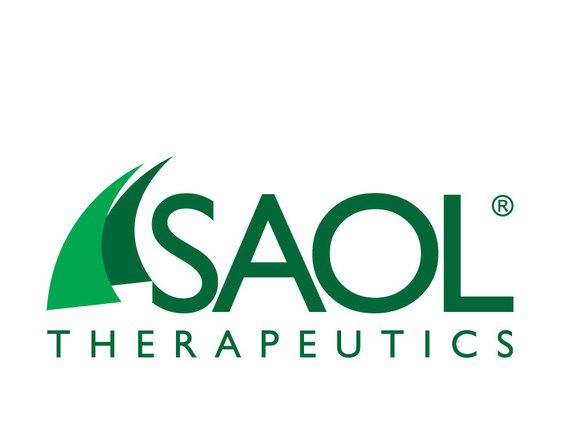Saol Therapeutics Announces Completion of Enrollment in Both the Phase II COMPASS Osteoarthritis Knee Pain Trial and the Phase II RAISE Limb Spasticity Trial
SL-1002 is currently being developed for the treatment of chronic knee pain associated with osteoarthritis (COMPASS Trial) and mild to severe limb spasticity (RAISE Trial). Topline data for the COMPASS Osteoarthritis Knee Pain Trial will be available in the first quarter of 2024, with topline data from the RAISE Limb Spasticity Trial available shortly thereafter.

ROSWELL, Ga, DUBLIN and HAMILTON, Bermuda, September 19, 2023 / PRNewswire/ – Saol Therapeutics, a privately held, clinical-stage pharmaceutical company, announced today that enrollment has been completed in the company’s two Phase II trials for SL-1002.
Both the COMPASS Osteoarthritis Knee Pain Trial ( NCT05470608 ) and the RAISE Limb Spasticity Trial ( NCT05311215 ) are each fully enrolled, at 132 patients and 32 patients, respectively.
SL-1002 is a novel, chemoneurolytic injection, that utilizes Saol’s proprietary CYCLOPHLEX TM technology.
“Running parallel, multi-indication Phase II studies for SL-1002 has only been possible due to our committed investigator partners, their research teams, and the tireless work of the employees at Saol Therapeutics,” said David Penake, CEO of Saol Therapeutics. “This is a tremendous milestone for our company, and we look forward to sharing the results with the medical community. While celebrating this accomplishment, our team has already shifted into preparing for what will be necessary to initiate the Phase III programs and expansion to other important indications.”
The COMPASS Osteoarthritis Knee Pain Trial is a multicenter, randomized (3:1), double-blind, placebo-controlled, single ascending-dose escalation study to assess the safety and efficacy of SL-1002 for the treatment of chronic knee pain associated with osteoarthritis in adult patients. The efficacy of SL-1002 will be assessed in comparison to placebo in its ability to reduce the average pain intensity at 3 months (12 weeks). The safety of SL-1002 will be assessed throughout the study compared to placebo when used for treating chronic knee pain associated with osteoarthritis. Additional secondary measures include improvements in function, concomitant medication, and healthcare utilization.
“The completion of enrollment in the COMPASS Osteoarthritis Knee Pain Trial brings this therapy one step closer to ultimately helping patients,” said Principal Investigator Zachary McCormick, MD, Vice Chair and Associate Professor of Physical Medicine and Rehabilitation at the University of Utah. “Recent developments in our understanding of the neuroanatomy of the knee indicate that this treatment could be incredibly beneficial to the millions of patients who deal with chronic pain related to osteoarthritis of the knee. We have enjoyed collaborating with the Saol Therapeutics team and the 14 additional sites in the COMPASS trial. I look forward to seeing the results soon.”
The RAISE Limb Spasticity Trial is a randomized (3:1), double-blind, placebo-controlled single ascending dose escalation study intended to assess the safety, pharmacokinetics, and efficacy of a single treatment of SL-1002 in patients with mild to severe limb spasticity. Following randomization, the study period will be up to 26 weeks. The primary endpoint is the overall safety profile of a single treatment exposure of SL-1002 in comparison to a placebo.
Saol Therapeutics currently expects topline results for the COMPASS Osteoarthritis Knee Pain Trial in the first quarter of 2024, and the RAISE Limb Spasticity Trial in the second quarter of 2024.
About COMPASS Osteoarthritis Knee Pain Trial
The COMPASS Osteoarthritis Knee Pain Trial is a multicenter, randomized, double-blind, placebo- CO ntrolled, single-ascending dose escalation study to assess the safety and efficacy of SL-1002 injectable for treat M ent of PA in a SS ociated with O steo A rthritis of the knee. ( NCT05470608 ).
About RAISE Limb Spasticity Trial
The RAISE Limb Spasticity trial is a R andomized double-blind, placebo-controlled, single A scend I ng dose escalation study to assess the S afety, Pharmacokinetics and E fficacy of SL-1002 in adult patients with limb spasticity. ( NCT05311215 ).
About SL-1002
SL-1002 is a novel, chemoneurolytic injection, that utilizes Saol’s proprietary CYCLOPHLEX TM technology. It is currently being developed for the treatment of chronic knee pain related to osteoarthritis and limb spasticity, both in the adult population (18+) in the United States.
About Saol Therapeutics
Saol Therapeutics (pronounced “Sail”) is a privately held, clinical-stage, pharmaceutical company with operations in Roswell, GA, Dublin, Ireland, and Hamilton, Bermuda. Saol is focused on development activity in CNS disorders such as spasticity and pain management, and orphan diseases. Saol is committed to providing and advancing therapeutic options for patients and the physicians treating these populations. For more information, visit www.saolrx.com.
Saol Therapeutics Contact
Senior Vice President, Strategy
Brian Nappi
bnappi@saolrx.com





